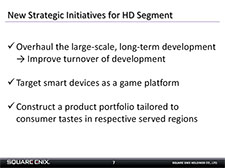-
Print
- (Continued from previous page.)

-
As a result, as explained earlier with respect to the Income Statement, the 'Provision for Allowance for Sales Returns' and 'Advertising Expenses' increased, and even though development expenses were covered, these titles did not sufficiently contribute to profits. I believe that this situation is not a one-time event for the fiscal year ended March 2013, but is a structural issue within the packaged product sales model. As a result, I believe it is difficult to guarantee an appropriate return on our investments within the revenue model of purely packaged software. It is important to consider how to change business models in light of rigidity from the perspective of pricing, and I believe that the transformation to online titles and the diversification of profit opportunities is the key. While we have stated this before, we intend to pursue this with further intensity going forward.

-
I would like to present 3 initiatives to reform our HD game business. The first initiative is to re-consider long-term, large-scale development. Long-term, large-scale development makes asset turnover very slow, and the period from investment to sales is too long, so we must consider how to increase turnover. I recognize that the reasons the results for the fiscal year ended March 2013 were so disappointing were; firstly, from the revenue generation perspective, the rigid nature of the packaged product sales business model turned sour, and secondly, from the development perspective, the increasing investment period resulted in a deterioration of asset turnover. Therefore, from a development perspective, it will be important to consider how to improve asset turnover. There is a huge difference from the perspective of business risk between a model where no revenue opportunities take place for several years until the product is completed (upon which investments are recovered at one time), and a model where revenue opportunities exist in some form prior to product completion, even if the amount of money invested is the same. I believe this is a crucial point. This problem is not simply a financial issue. Poor asset turnover means that we have little contact with customers during several years of development of a game title. In a model where a game is developed without customers knowing what it's like for many years, the product is presented to customers only after it has been finished, and all investment is recovered at one time, customers are forced to wait for too long, and opportunities for profit are passed up.
